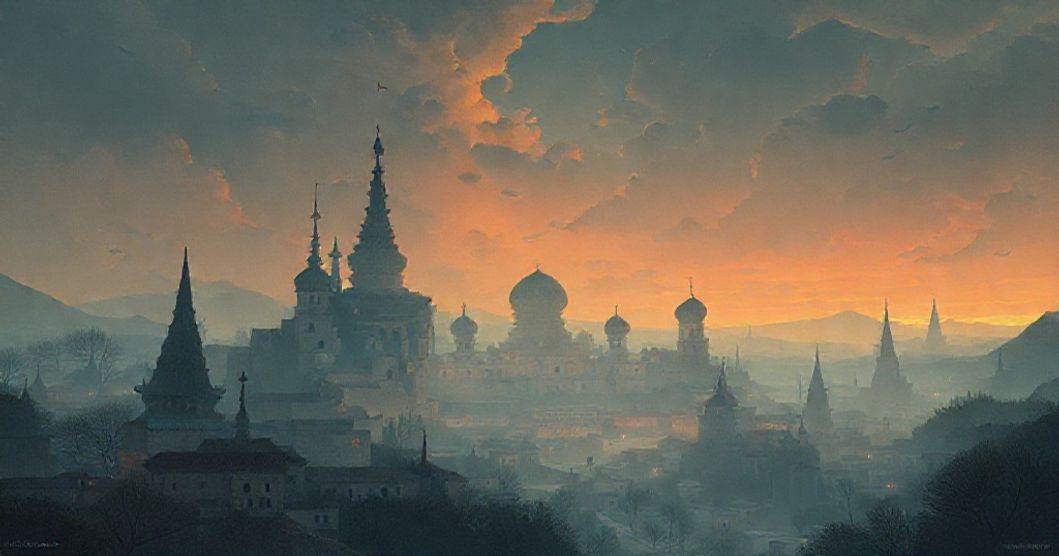PART 1: DREAM PRESENTATION
Dreams often serve as mirrors to our unconscious, reflecting not just random images but the complex interplay of history, identity, and desire. Consider this vivid dream experience: The dreamer finds themselves immersed in a digital realm, Rise of Nations, where strategic choices collide with historical memory. The narrative begins with deliberate selection—a small nation, Slovakia, as the starting point—before rapidly expanding into a vast khanate spanning Central Europe. This expansion is not merely territorial; it is charged with symbolic weight, merging historical empires and modern borders into a single, unnamed entity. The dream’s tension arises from Germany’s attempt to “reform” its World War II-era borders and Bulgaria’s transformation into a “free Tsardom,” adding layers of historical and psychological resonance.
The dreamer’s journey unfolds in three distinct phases: the initial choice of Slovakia, the rapid unification of territories, and the symbolic naming and flag design. The Rise of Nations framework provides a familiar, game-like context, yet the dream transcends mere gameplay, becoming a vehicle for exploring identity, power, and historical memory. The Avar Khaganate flag, a nod to medieval Eurasian steppe empires, introduces an ancient, nomadic dimension to the modern European landscape, suggesting a longing for ancestral roots or a desire to reclaim historical agency.
PART 2: CLINICAL ANALYSIS
Want a More Personalized Interpretation?
Get your own AI-powered dream analysis tailored specifically to your dream
🔮Try Dream Analysis Free1. Symbolic Analysis: The Khanate as a Unifying Archetype
The “Unnamed Khanate” itself emerges as a powerful symbol of unity in a fragmented world. In dreamwork, khanates often represent nomadic or steppe-based power structures, evoking images of expansion, cultural synthesis, and decentralized authority. By merging Central European nations—Slovakia, Czech Republic, Hungary, Austria, Bavaria, Slovenia, Transylvania, and northern Italy—the dreamer creates a territory that bridges historical divides: the Habsburg legacy of Austria, the Magyar heritage of Hungary, the Alpine culture of Bavaria, and the Ottoman-influenced Transylvania. This synthesis suggests an unconscious yearning for integration in a world that often emphasizes division.
The Avar Khaganate flag, a green field with angular designs, connects the dream to Eurasian steppe history, where nomadic tribes built vast empires through military prowess and cultural adaptability. In this context, the flag symbolizes a desire to reclaim ancestral “power” or to assert control over one’s historical narrative. The “unnamed” quality of the khanate may reflect the dreamer’s discomfort with rigid labels or a recognition that true unity defies categorization.
2. Psychological Perspectives: From Game to Unconscious Desire
Freudian theory might interpret this as a “wish-fulfillment” dream, where the dreamer gains agency in a realm (the game) where waking life may feel fragmented or uncontrollable. The Rise of Nations framework, a digital sandbox for empire-building, mirrors the unconscious mind’s need to experiment with power dynamics. The rapid unification could represent a desire to overcome feelings of smallness or powerlessness in waking life.
Jungian psychology, however, offers a richer layer: the khanate as a personal unconscious archetype of “order” or “integration.” The Central European territories, each with distinct histories, may symbolize different aspects of the dreamer’s psyche—cognitive, emotional, or cultural—that seek unification. Germany’s “WW2 border reform” echoes historical trauma or guilt, while Bulgaria’s “free Tsardom” suggests a longing for autonomy or resistance against external control.
Neuroscientifically, the dream reflects the brain’s pattern recognition: connecting game mechanics (resource management, diplomacy) to historical knowledge (WW2, Ottoman empires, Avar Khaganate). This merging of digital and historical memory is a hallmark of how the brain processes identity and legacy during sleep.
3. Emotional & Life Context: The Unconscious as Historian
The dream likely emerges from the dreamer’s engagement with history, strategy games, or a period of personal transition. The choice of Slovakia as the starting point hints at a connection to that nation—perhaps ancestral ties, cultural affinity, or a feeling of being “small” in a larger world. The rapid expansion suggests a response to stressors: maybe workplace pressure, relationship uncertainty, or a sense of disconnection from one’s roots.
Germany’s territorial anxiety reflects a broader cultural preoccupation with historical guilt or the fear of repeating past mistakes. Bulgaria’s “free Tsardom” may represent a desire to reclaim independence or resist assimilation, while the khanate’s borders mirror the dreamer’s need to create order from chaos—whether in personal relationships, career, or self-concept.
4. Therapeutic Insights: Unpacking the Khanate’s Lessons
For the dreamer, this dream offers several reflections: First, the khanate’s “unnamed” status suggests that true power lies in flexibility, not rigid definitions. Second, the merging of territories hints at the value of integrating different aspects of self—past and present, cultural and personal. Third, the game context invites exploration: What aspects of waking life feel like a “game” I need to master?
Practical exercises include journaling about waking life’s “unified” vs. “fragmented” areas. Asking: Which historical or cultural narratives do I unconsciously carry? can reveal how the dream mirrors identity work. Reflecting on the Avar Khaganate’s nomadic roots might uncover a need for adaptability or a desire to “cross borders” in creative ways.
5. FAQ SECTION
Q: Why did the dreamer choose Slovakia as the starting point?
A: Slovakia may symbolize the dreamer’s connection to that region (ancestral, cultural, or emotional) or represent a “small” beginning that evolves into something larger, reflecting a desire to overcome limitations.
Q: What does the “Unnamed Khanate” signify?
A: It likely represents the unconscious longing for unity, control, or identity without rigid labels—suggesting true power lies in flexibility and integration rather than fixed definitions.
Q: How does the Rise of Nations game element affect interpretation?
A: The game acts as a metaphor for waking life’s “empire-building” efforts, where the dreamer experiments with control, strategy, and legacy in a safe, symbolic space.
